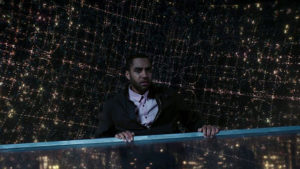Revisiting the Nethersphere
Guest contributor Anna Rinaldi explores Doctor Who’s presentation of the afterlife one year on.

Doctor Who asks the first question, the oldest question, the question that must never be answered: “Are you afraid of death? “
Death is a fundamental mystery to the living. For some, it is a ravenous force, hungrily devouring each passing moment of our lives, as the clock ticks, and the chimes ring portentously. For others, it is a paradise of golden-studded balustrades, and white, billowy clouds festooned with angels and eternal peace. But for many, death is fear of the unknown, a fear slithering and rasping softly beneath the trapdoors of our minds. It is the fear of unblinking, luminous eyes in the dark or the uncertainties of tomorrow. We expect some startling revelation, some almighty spectacle to satisfy this dread we’ve nurtured our entire lives. But what if death is simply indefinite life, as we know it? Nothing grand, nothing spectacular. There are no hooked claws, pockmarked devils, or fiery rings of doom. There are no choirs of angels or black voids ─ just a lonely metropolis of lost souls, living without a purpose and breathing despite feeling the chilling sensation of their decaying corpses. When it comes dying, therefore, maybe it isn’t the unknown we should be frightened of, but the familiar.
From the stigmas of battle to childhood disillusionment, Doctor Who has tackled some exquisitely dark subject matter. By far, “Dark Water”/”Death in Heaven” is the most ambitious. This two-part installment gives a view to a death that is disturbingly unremarkable and wretchedly ordinary.
 Danny Pink, the veteran soldier and Coal Hill maths teacher, awakens in a dull, colourless office complex, frugally furnished and, on the whole, quite dull. It takes a moment for him to realise that the car did in fact intercept his body, and he did not survive the collision. Before he can marvel at his unpropitious fate, however, an enthusiastic grey-suited manager slides over a stack of monotonous paperwork – the last thing you would expect to follow you into this fabled afterlife. A few minutes later, shivering and disconcerted, Danny steps out onto a balcony, overlooking a morbidly beautiful Nethersphere. As if foreshadowing, the twinkling lights and towering skyscrapers seem arranged to resemble a motherboard circuit, but Danny and the audience have yet to realise that the Nethersphere is just a temporary storage unit to which minds of the recently deceased are uploaded. Both to him and to us, the Nethersphere is it – the place that lies beyond the realm of the living… And it is not at all what we expected.
Danny Pink, the veteran soldier and Coal Hill maths teacher, awakens in a dull, colourless office complex, frugally furnished and, on the whole, quite dull. It takes a moment for him to realise that the car did in fact intercept his body, and he did not survive the collision. Before he can marvel at his unpropitious fate, however, an enthusiastic grey-suited manager slides over a stack of monotonous paperwork – the last thing you would expect to follow you into this fabled afterlife. A few minutes later, shivering and disconcerted, Danny steps out onto a balcony, overlooking a morbidly beautiful Nethersphere. As if foreshadowing, the twinkling lights and towering skyscrapers seem arranged to resemble a motherboard circuit, but Danny and the audience have yet to realise that the Nethersphere is just a temporary storage unit to which minds of the recently deceased are uploaded. Both to him and to us, the Nethersphere is it – the place that lies beyond the realm of the living… And it is not at all what we expected.
In the Nethersphere, death seems to be eerily normal. There are chairs to sit in, Wi-Fi to access, buildings to gaze upon – nothing new, no lavish commodities, no blinding lights. But perhaps the most unnerving aspect is Danny’s ability to feel pain – those difficult emotions that percolate tears, wrench your chest, and twist your stomach.
 Death is not depicted as terrible, or wonderful, just… boring. All of life’s psychological trauma still surfaces, and physical pain still stings. Danny’s shuddered breaths and streaming tears as Clara terminates her final phone call reinforces this dismal reality all the more. If death is so lifelike, then what is the point? During life, we desperately wish to avoid and suppress emotional turmoil and suffering – that unbearable burden, constantly aching and taxing the mind. Although the ambiguity of death can be terrifying, we at least find comfort in the possibility of a painless existence. With that hope dashed, what then?
Death is not depicted as terrible, or wonderful, just… boring. All of life’s psychological trauma still surfaces, and physical pain still stings. Danny’s shuddered breaths and streaming tears as Clara terminates her final phone call reinforces this dismal reality all the more. If death is so lifelike, then what is the point? During life, we desperately wish to avoid and suppress emotional turmoil and suffering – that unbearable burden, constantly aching and taxing the mind. Although the ambiguity of death can be terrifying, we at least find comfort in the possibility of a painless existence. With that hope dashed, what then?
My instincts tell me to focus on the present, to not dwell on these contingencies and unpleasant meditations. But the notion of death can seem so bemusing and tantalising at times. Even after 200,000 years of exploring and discovering, we really know nothing about it and never will until we actually experience it. For once, humanity is simply groping in the dark.
 Doctor Who forced me to ponder what I expect from death. What hopes and fears surrounding this unpalatable concept lie engrained within the depths of my mind? It is difficult to imagine how I will die, what circumstances will place me at this threshold, and, even more so, what comes after. The least I expected was a sense of relief – something different from the drudgery and disappointments of everyday challenges, that although I may be leaving behind a habitual state of existence and familiar faces, there will be less daunting troubles and fresh anxieties at this new destination. Now, I’m not so sure.
Doctor Who forced me to ponder what I expect from death. What hopes and fears surrounding this unpalatable concept lie engrained within the depths of my mind? It is difficult to imagine how I will die, what circumstances will place me at this threshold, and, even more so, what comes after. The least I expected was a sense of relief – something different from the drudgery and disappointments of everyday challenges, that although I may be leaving behind a habitual state of existence and familiar faces, there will be less daunting troubles and fresh anxieties at this new destination. Now, I’m not so sure.
In the end, the Nethersphere never really was heaven, paradise, or the Promised Land but, simply, a ploy used by Missy to resurrect the Cybermen. Death still remains a mystery, as it should, and all of these previously posed questions are deferred. Thus, we return to mere speculation. Our thoughts are still consumed by that crippling fear of the unknown, of what awaits us. Even so, for that brief span of time during the Series 8 finale, I was utterly convinced, and this new prospect of death sent paralysing frissons down my spine. And if death is indeed all that Doctor Who portrayed it to be, then perhaps my fears were perfectly rational.








